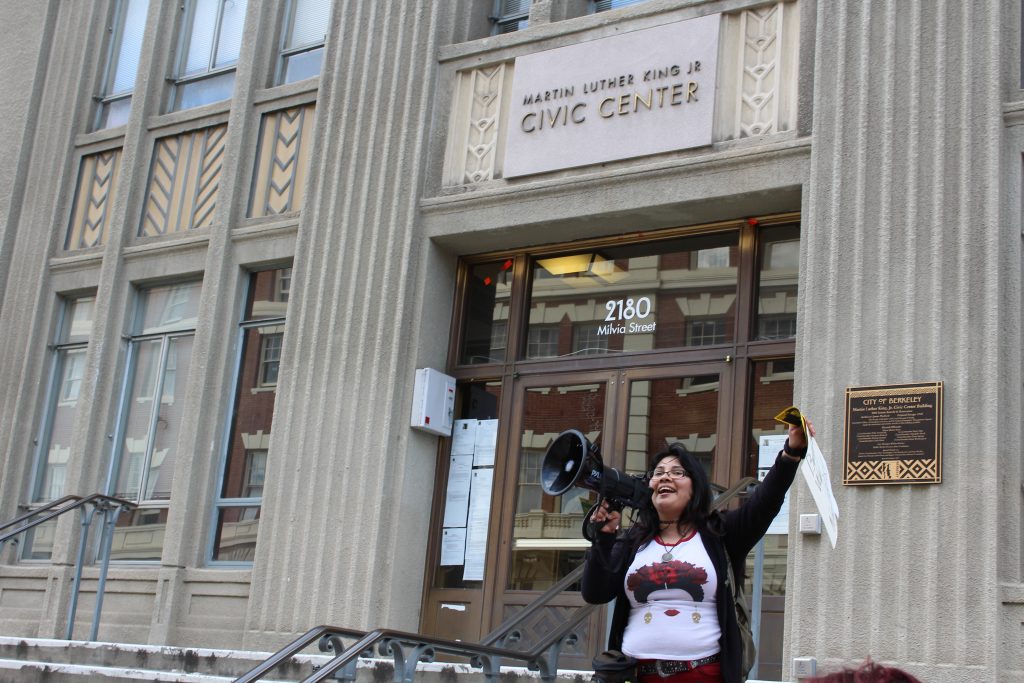Activists are crossing neighborhood lines to support each other in the fight for homeless rights.

I have seen something quite remarkable start to develop over the last few months. In the face of increased pressure on working people to find decent housing, some of the most hard-pressed people in the Bay Area have not only been standing their ground against threats of eviction—they are also traveling across neighborhoods to support comrades in other struggles doing the same.
The people who are doing this include those facing the hardest hurdles, including homelessness. In particular, I have observed people unifying to fight back against mass towing of RVs, protest the evictions of homeless encampments in Oakland, and defend People’s Park in Berkeley. The unity across these struggles is remarkable to see.
How and why did this all come together? For me, it came out of
trying to understand the devastation I have witnessed in West Oakland.
On October 23rd, I watched dozens of homeless community members scramble to save their belongings as the RV’s where they had been living were towed under police supervision. “Don’t let us see you in Oakland again,” the police told many of the people, including those who had lived in the city for years. Police laughed while drinking Starbucks coffee as people desperately tried to save what little they could.
That day, 40-some people were thrown out on the street. After discussing a need to resist, at first a handful of people gathered in front of city hall, and raised a banner that read, “Mayor, why did you take our RV’s? Why did you take our hope?” A member of Mayor Schaaf’s staff told residents that the vehicles should have never been towed.
While the city did nothing to help these homeless Oaklanders get their possessions back, all hope was not lost. That day we met Clark Sullivan, a homeless leader and founder of the Landless People’s Alliance. He saw our protest, and told his friends at the Here There encampment in South Berkeley about it. In the following weeks, we had impressive protests with our combined force. Such pressure finally exposed the maneuvers of the city: after residents refused to vacate the Mayor Schaaf’s office on December 4th, she made an inquiry into the Oakland Police Department. They then admitted that the vehicles had been crushed on November 12th, not even three weeks after being towed. All the personal property within them (computers, clothes, ID cards, immigration documents) had been disposed of as well.
While the possessions had been crushed, our spirits were not. The experience of joining forces with unhoused organizers from another city lit a fire underneath us, and many of us have continued to organize, both in the Oakland community and with our new friends in Berkeley.
As in West Oakland, vulnerable people in Berkeley are being harmed by administrative arrogance and corruption. The UC Berkeley administration has plans to make student housing out of People’s Park—the historic park above Telegraph Avenue which has been a crucial space for radical organizing among homeless people, and central to many radical movements such as the anti-war movement, the Black liberation struggle, and the third world liberation struggle. The administration has insisted that they will not have public hearings over their decision, discarding even the frail pretensions of caring about democratic procedure. One administrative official explained, “those people have had their chance.”
During a protest about the University’s decision to develop on the park, a homeless man named Tony McNair was run over by an angry driver, and sustained severe injuries to his legs. At a community meeting in People’s Park shortly afterward, several people said that when they tried to tell police investigators about the hit and run, the police acted disinterested, and didn’t even take notes. Appeals to the City of Berkeley to act have been similarly dismissed. The condescending attitude conveyed by the words of the UC Berkeley administrator seem to be their unspoken reply: “these people have had their chance.”
As the struggle to save People’s Park wages on, the unity that has begun to emerge remains crucial to getting justice for Tony, and saving the park. In the last few months people in these struggles have shown that we can and must work together between these various fronts. The outrages occurring now in places like Berkeley or Oakland did not begin in these places. They are connected to the overall structure of our thoroughly corrupt and undemocratic system.
And developments in these locations should not end locally either. In the past generation, events related to earlier organizing in these places contributed to the launching of the Bay Area Revolutionary Union and the Black Panther Party. We must similarly resist in ways that can build larger organizations and resistance, rather than to fall into the framework that sees one battle—such as the important fight to save People’s Park—as an ends in itself.
Dayton Andrews is a resident of Oakland and organizer for the United Front Against Displacement (UFAD).
